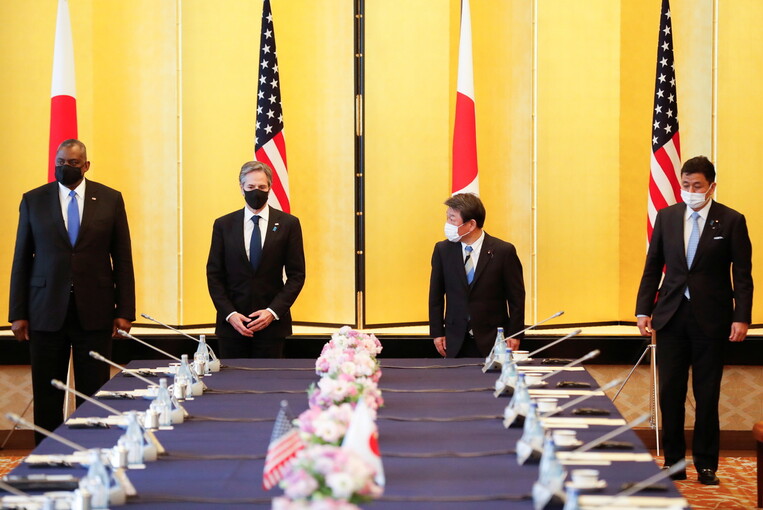Joint announcement of diplomatic and defense 2+2 conference
‘Warning’ for invocation of China’s maritime police
Concerned about Hong Kong and Xinjiang Uighur

On the afternoon of the 16th, the US and Japanese governments held the Security Consultative Committee (2+2 meeting) for the first time since the inauguration of the US administration in Tokyo, Japan. From left), Secretary of State Tony Blincoln, Japanese Foreign Minister Toshimitsu Motegi and Defense Minister Nobuo Kishi take commemorative photos at the meeting place, Ikura Guesthouse. Tokyo/Reuters Yonhap News
The United States and Japan made it clear that the purpose of the talks is to contain China, including criticizing and mentioning’China’ four times in a joint announcement of the Minister of Foreign Affairs and Defense (2+2) meeting on the 16th. The US and Japan held a meeting of the Security Council (2+2) meeting in Tokyo, Japan, followed by a bilateral meeting with the Ministers of Foreign Affairs and Defense, respectively, and attended by all four members. At a joint press conference after the meeting, “China’s actions that are not consistent with the existing international order are raising political, economic, military, and technological challenges for the US-Japan alliance and the international community.” “It undermines the international system based on rules. And oppose actions that harm the stability of the region.” The US-Japan ‘2+2′ meeting was attended by US Secretary of State Tony Blincoln and Defense Minister Lloyd Austin, Japan’s Foreign Minister Toshimitsu Motegi and Defense Minister Nobuo Kishi. This meeting has been two years since April 2019, and it is the first time a ministerial-level official has visited Japan since the inauguration of the Joe Biden administration. In particular, the meeting between the US and Japan is symbolized in that it is the first allied diplomacy of the Biden administration, which took place prior to the Korea-US diplomatic and defense ministers’ meeting (17-18) and the high-level US-China talks (18-19) Big. At this meeting, the biden administration’s foreign policy stance of’checking China with the alliance’ was revealed in specific details. Ministers of both countries emphasized that “the US-Japan alliance will be the cornerstone of peace, security and prosperity in the Indo-Pacific region.” In addition, by addressing the issues of Hong Kong, Taiwan, and Xinjiang Uyghur, as well as the South and South China Seas, they pointed to China as the target of harming the stability of the’India and Pacific region’. At a press conference, Secretary of State Blincoln said that China has “in many places put the values of democracy, human rights and rule of law into crisis.” He criticized China’s oppression of Hong Kong’s democratic groups as “using force to attack,” and against Xinjiang Uyghur, “it is violating human rights. This is a violation of international law.” In particular, the US and Japan expressed concern about the movement that caused confusion in the region, especially for the Chinese government’s implementation of the’Marine Police Act’ that allows the use of weapons by the sea and police. He emphasized that it is the subject of the’Article 5 of the US-Japan Security Treaty’, which set the obligation. Defense Secretary Austin said, “China is acting coercive,” he said. “This is also threatening our local allies.” Minister Blincoln also emphasized the cooperation of alliances and friends for the realization of a’free and open India-Pacific’. At a press conference, he said, “The Indo-Pacific region is a geographically important place,” he said. “With our friends and allies, we must bring together a common concept in a strong form and present a promise and obtain security guarantees for everyone.” He visited Korea on the 17th and 18th, adding, “I would like to convey this message to Korea in the future.” Although it did not directly mention’China’ or’Quad Plus’, it seems to be a considerable burden on the Korean government. By Kim So-yeon, staff reporter
